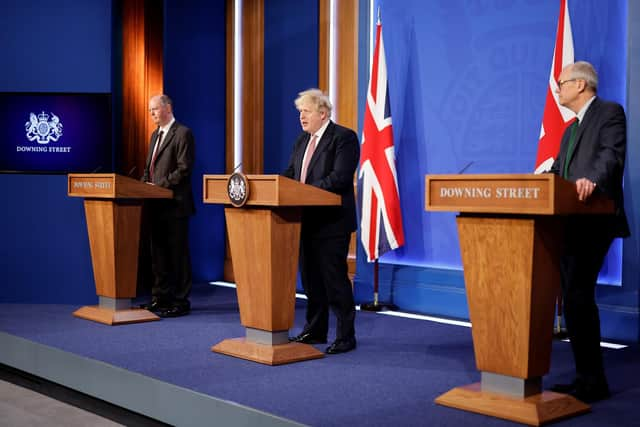Scientists stress importance of isolation as remaining Covid rules scrapped in England
Yesterday Boris Johnson announced the scrapping of the legal requirement to isolate after a positive Covid test, and the ending of universal free testing in England, emphasising the need for people to take “personal responsibility” when it comes to tackling the virus.
He called the changes a “moment of pride” after “two of the darkest, grimmest years in our peacetime history” but warned against declaring “victory” as of yet.
Advertisement
Hide AdAdvertisement
Hide AdHis two top scientists, Sir Patrick Vallance and Professor Sir Chris Whitty, struck a cautious tone about the developments, declaring “this pandemic is not over”.


From Thursday, people in England will no longer be required by law to stay home if they are infected with coronavirus, although guidance will encourage them to isolate for at least five days.
Meanwhile, universal free testing will be withdrawn on April 1, and will instead be focused on the most vulnerable, with the UK Health Security Agency set to determine the details, while asymptomatic testing will continue for social care staff.
England’s Chief Medical Officer Professor Sir Chris Whitty told the country that people should still “try to prevent other people getting it” if they find themselves infected with Covid,
Advertisement
Hide AdAdvertisement
Hide AdThere were also warnings about the potential for new variants and how severe they may be, as the virus continues to develop “quite fast probably for the next couple of years”.
Chief Scientific Adviser Sir Patrick told a Downing Street briefing: “There is no guarantee that the next variant is as reduced severity as Omicron.
“As is it evolves what it is trying to do is to transmit more readily.
“The change in severity is a random by-product.
“We expect there to be further variants and they could be more severe.”
Advertisement
Hide AdAdvertisement
Hide AdMr Johnson received praise from his backbenches following yesterday’s announcement made first to the House of Commons, however he was keen to emphasise that “today is not the day we can declare victory over Covid
because this virus is not going away.”
Speaking at the Number 10 press briefing yesterday evening, he told the country: “It is the day when all the efforts of the last two years finally enable us to protect ourselves whilst restoring our liberties in full.
“After two of the darkest, grimmest years in our peacetime history I do believe this is a moment of pride for our nation and a source of hope for all that we can achieve in the years to come.”
Shortly before the Prime Minister made his speech in the Commons, it was announced that the most vulnerable will be offered another booster vaccine this spring. Sajid Javid said the top-up jab for people aged 75 and over, the immuno-suppressed and those living in care homes will help those at the highest risk of serious illness maintain a high level of protection against the virus.
Advertisement
Hide AdAdvertisement
Hide AdThe NHS in England will offer people the jab from around six months after their last dose, with further details due to be set out shortly.
Health Secretary Mr Javid said: “We know immunity to Covid-19 begins to wane over time.
“That’s why we’re offering a spring booster to those people at higher risk of serious Covid-19 to make sure they maintain a high level of protection. It’s important that everyone gets their top-up jabs as soon as they’re eligible.
“The JCVI will keep under review whether the booster programme should be extended to further at-risk groups.”
Comment Guidelines
National World encourages reader discussion on our stories. User feedback, insights and back-and-forth exchanges add a rich layer of context to reporting. Please review our Community Guidelines before commenting.